Joy Marie Clarkson's Blog, page 11
January 14, 2019
I wrote a book! — Girls' Club Podcasts

Listen to my podcast to hear all about it. This book is our story, a story of love , l oneliness , and faithful friendship .
At it’s heart, it is simply the story of the friendship between me, my sister, and my mom, and the ways that shaped who we are as people and how we live. It is about how the throng of women I was surrounded by growing up shaped my image of what kind of woman I could become. It is about the friendships in our lives that have kept us strong and been great sources of delight. It’s our attempt to honor the beauty, satisfaction, and profound of friendship.
You may be wondering: why tell this story now?We have several reasons.
Because we believe Women’s Friendships have been triviliazed and overlooked, which has impoverished our lives as women. Women’s friendship is not a light, fluffy thing of no consequence, but a powerful force for good in the world. Throughout all cultures and centuries, women have kept the world spinning through their fellowship. We feel that the vision has been lost, and that because of it, many women feel lonely, wounded, and unsatisfied. We want to recapture, and recast a vision of the importances of women’s friendships.
Because we feel like loneliness and isolation have spread their icy fingers across the globe, beating down people’s morale and causing their love to grow cold. We’ve watched that loneliness spread, but we’ve also experienced it ourselves. Some have called it a loneliness epidemic. For the past several years, social scientists and psychologists have scratched their heads and wrung their hands regarding an overwhelming trend of loneliness in the West. Over the last fifty years, reports of loneliness have doubled. In a recent study based on a survey of 20,000 people, 47% said they always felt alone or lonely, 43% said they had no meaningful relationships and that they felt isolated from others. This trend toward isolation, loneliness, and friendlessness shows no partiality toward gender, age, race, or job.. We think this is having real consequences, and we need to be brave and clever as we respond to it.
Because we firmly believe that we cannot be the women God calls us to be on our own. We need people in our lives that support us and call us into growth in every area of our lives—intellectual, spiritual, emotional. We need friendships that not only satisfy our hearts, but challenge our spirits. We need friends to agitate and encourage us into growth.
The data seems to be screaming one painful truth: everybody is lonelier than they used to be. We want to fight that narrative. We want to be agents of friendship in a lonely world. And we want you to do it with us!Here’s several ways you can join the friendship revolution;Buy the book (and guidebook)!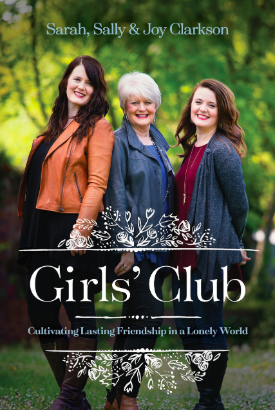
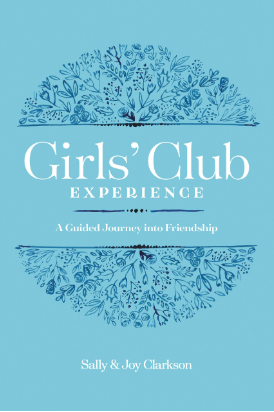
We want the book to get into as many hands as possible. And we hope that its message will spur people one toward starting their own Girls’ Clubs! In pursuit of the latter, I would recommend buying the Girls’ Club Experience, which we wrote specifically to be used in the context of a one on one or group context, to help people know each other more deeply and learn to support each other. I’m not usually a guidebook girl, but I really think this offers something unique, and builds on the book well. I’m almost as proud of it as the main book!
You can get both books at the buttons below or anywhere that sells books:Girls' Club — Amazon
Girls' Club Experience — Amazon
Girls' Club + Girls' Club Experience — Barnes and Noble
2. Join the Launch Team

If you’re passionate about seeing women flourish in community, help us get the word out by joining our launch team.
This is a private facebook group where you’ll get frequent updates on the books, challenges, and ways you can share about the message. People get really involved, and you never know: you may just make a friend! The other fun thing about the launch team is that you can be entered to win special Girls’ Club related prizes!
You might even win our special trip to Oxford…
To join the launch team, click the button below…
Join the Girls' Club Launch Team!!
3. Listen to the Girls’ Club Podcast

We interviewed women we admire about how to find, cultivate, and maintain friendships in a lonely world.
For the last three weeks, my mom and I have been hard at work recording over TWO DOZEN (ahhhhh) podcasts on friendship. We wanted to launch the book by discussing this important topic with women we admired. We’ll be posting some of them on my podcast, and most of them on my mom’s.
These are the podcasts you have to look forward to on Speaking with Joy:Katelynn Beaty: a writer and the (former) first female and youngest managing editor at Christianity Today. We talked about the things that make us lonely and the spiritual importance of friendship, and how it was the main relationship Jesus enjoyed on earth. We also talked about how to make room for each other’s callings in our friendships.
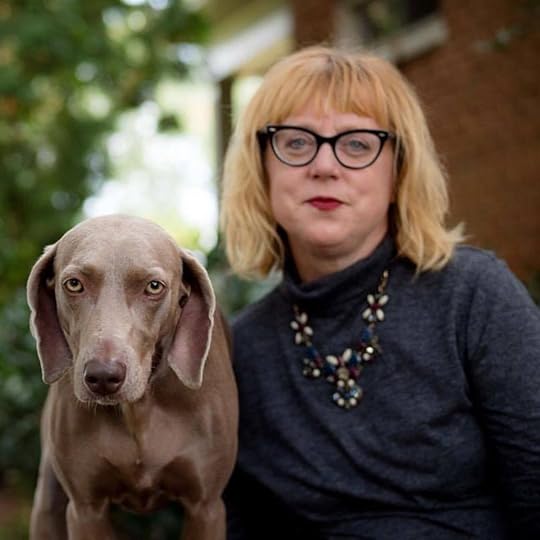
Elena Trueba: a Harvard graduate student and my best friend/college roommate. We’ll be doing an advice podcast, so make sure to send us all of your juiciest questions! We’re also happy to help you discover what books and TV shows will light up your life.

Ashlee Cowles: a novelist and dear friend. Ashlee and I talked about how personality plays into our friendships— for good and ill! And we talked about how friends can help us grow and smooth out the rough edges of our personality. It was such a joyful, fun podcast to record… and so important!
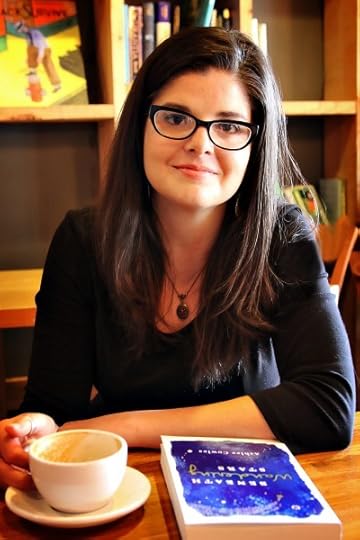
Boze Herrington: Boze runs the delightful Twitter account The Library Haunter. Boze and I bonded over a shared love of literature, so we’re going to discuss special literary friendships throughout history. Boze isn’t a girl, but he’s so lovely that he can be a special, honorary member of Girls’ Club.
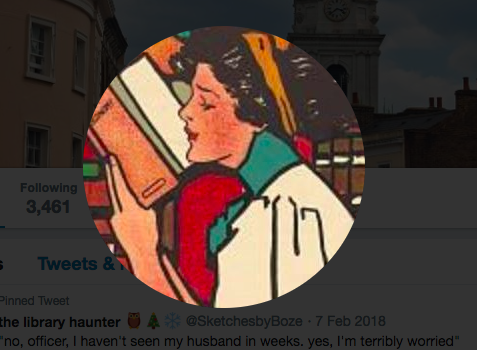
I’m so excited to share these podcasts with you! Just seeing them all laid out here gives me a little thrill. I hope you love them as much as I loved recording them. To keep up with the podcasts, make sure to subscribe on iTunes (or Stitcher… wherever you listen!). 4. Join us for the Launch Party on February 5th!
To celebrate the release of the book

Whew! That’s all for now, friends! Don’t forget to listen into this week’s podcast (below). Wishing you rest, love, and beauty!
December 23, 2018
Advent—The Light
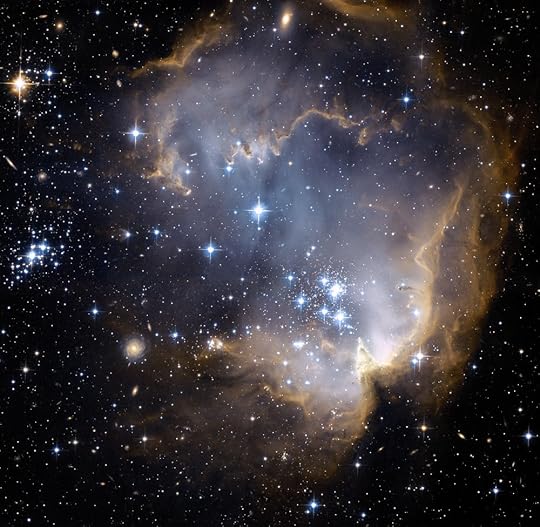
The people who walked in darkness have seen a great light;those who dwelt in a land of deep darkness, on them has light shone.
Isaiah 9:2
Eleven years ago, something very sad happened in my church. That night I learned that the world isn’t safe, but that God is real, that He sent his light into the darkness, and that the darkness will not overcome God’s light. In this final segment of the advent podcasts, we dwell on the coming of Christ’s light, and our role as bearers of that light in the world.
God is light

This is the message we have heard from him and proclaim to you, that God is light, and in him is no darkness at all. If we say we have fellowship with him while we walk in darkness, we lie and do not practice the truth.
1 John 1:5-6
2. God sends his light into the world through Christ
In the beginning was the Word, and the Word was with God, and the Word was God. He was in the beginning with God. All things came into being through Him, and apart from Him nothing came into being that has come into being. In Him was life, and the life was the Light of men. 5 The Light shines in the darkness, and the darkness did not comprehend it.
John 1:1-4
3. We are called to walk as children of the light
Walk as children of the light.
Let no one deceive you with empty words, for because of these things the wrath of God comes upon the sons of disobedience. Therefore do not be partakers with them; for you were formerly darkness, but now you are Light in the Lord; walk as children of Light 9 (for the fruit of the Light consists in all goodness and righteousness and truth), trying to learn what is pleasing to the Lord. 11 Do not participate in the unfruitful deeds of darkness, but instead even expose them; for it is disgraceful even to speak of the things which are done by them in secret. 13 But all things become visible when they are exposed by the light, for everything that becomes visible is light. 14 For this reason it says,
“Awake, sleeper,
And arise from the dead,
And Christ will shine on you.”
Therefore be careful how you walk, not as unwise men but as wise, making the most of your time, because the days are evil.
Ephesians 5:6-16
December 16, 2018
The Good Shepherd
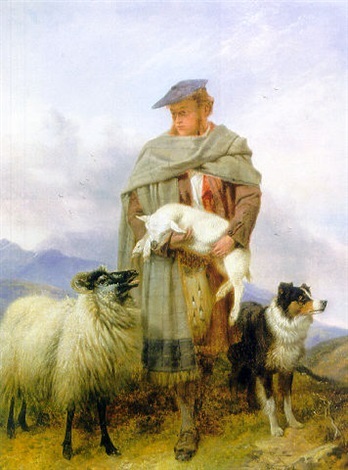
Like a shepherd He will tend His flock,In His arm He will gather the lambsAnd carry them in His bosom;He will gently lead the nursing ewes.
Isaiah 40: 11
In Advent, we prepare for the coming of Christ. But who is Christ to us?I was thinking about this as I listened to Handel’s Messiah this year. This wonderful piece of music traces all the messianic anticipations of the Old Testament, their longing for a heavenly king, a ruler, a judge, a mighty counsellor. But hidden in there is another title: the good shepherd. This one struck my heart. The coming Christ is to be a king, a ruler, a judge, but he is also to be a shepherd, tender, patient, caring.
I sat in a coffee shop one day listening to “He Shall Feed His Flock” and tears sprung into my eyes. There is a tenderness, a safety, an intimacy expressed in the simple words of Isaiah’s prophecy: “He will gather the lambs and carry them in his bosom” and I am one of his lambs. Yes, Christ will come to rule and reign, but he also came to tend, to gather, to carry, to gently lead. My heart needed to hear this.
Christmas is a joyful time, but also a tender time.Many people carry sadness, disappointment, or guilt at this time of year.And that is why I think it is important to dwell on Christ as the shepherd, gently caring for us. This idea was brought home to me in a special way when I found a series of paintings of Scottish Highland shepherds by Richard Ansdell. I’ve lived in Scotland for the last two and a half years, so something in these pictures was familiar. They gave me a new way to image Jesus’ tenderness, and a new way to receive his love.
So this week in the podcast, we will be anticipating, dwelling on, and appreciating one of the messianic promises of advent: that the good shepherd will come and lead us with compasssion.
God’s heart toward you is tender, loving, he longs to carry you. This is the truth we will explore in this week’s advent podcast and meditation. Let us meditate on that beautiful truth this week of advent!For best results, listen to the podcast through the purple box below (or on iTunes) and follow along in the show notes.oh, and one more thing!
I recorded this episode with one of the deepest, most loving people I know: Gwennie.
Gwennie is one of my family’s oldest and dearest friends. She and my mother were missionaries together in Poland in the 70’s. I grew up with many frequent visits to Eben house, Gwennie’s beautiful Kentucky cottage. Gwennie is closer than family, and for years she visited us before Christmas. And this year I had the great pleasure of visiting Gwennie! We’d planned on this visit for over two years. I’m typing this in the airport, and I just have to say: this visit was a gift!
Gwennie very graciously agreed to record this podcast with me. Gwennie has a deep knowledge of scripture, a rich, contagious laugh, and many stories about me as a little girl. All this to say… I think you’ll really enjoy this episode. :-)Isaiah 40

Isle of Skye, Richard Ansdell
“Comfort oh Comfort My people” says your God,“Speak kindly to Jerusalem.”Isaiah 40: 1-11
Comfort, comfort my people,
says your God.
2 Speak tenderly to Jerusalem,
and proclaim to her
that her hard service has been completed,
that her sin has been paid for,
that she has received from the Lord’s hand
double for all her sins.
3 A voice of one calling:
“In the wilderness prepare
the way for the Lord[a];
make straight in the desert
a highway for our God.[b]
4 Every valley shall be raised up,
every mountain and hill made low;
the rough ground shall become level,
the rugged places a plain.
5 And the glory of the Lord will be revealed,
and all people will see it together.
For the mouth of the Lord has spoken.”
6 A voice says, “Cry out.”
And I said, “What shall I cry?”
“All people are like grass,
and all their faithfulness is like the flowers of the field.
7 The grass withers and the flowers fall,
because the breath of the Lord blows on them.
Surely the people are grass.
8 The grass withers and the flowers fall,
but the word of our God endures forever.”
9 You who bring good news to Zion,
go up on a high mountain.
You who bring good news to Jerusalem,[c]
lift up your voice with a shout,
lift it up, do not be afraid;
say to the towns of Judah,
“Here is your God!”
10 See, the Sovereign Lord comes with power,
and he rules with a mighty arm.
See, his reward is with him,
and his recompense accompanies him.
11 He tends his flock like a shepherd:
He gathers the lambs in his arms
and carries them close to his heart;
he gently leads those that have young.

Christ will come as a King, powerful and glorious. But the king is also the Good Shepherd. He tenderly cares for us, his vulnerable flock. He holds us close to his heart. 2. “He Shall Feed His Flock” by George Fredric Handel
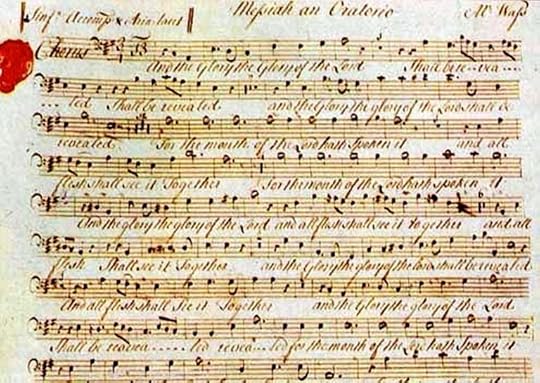
“Come to me, all you who are weary and burdened, and I will give you rest. Take my yoke upon you and learn from me, for I am gentle and humble in heart, and you will find rest for your souls. For my yoke is easy and my burden is light.”
Matthew 11:28-30
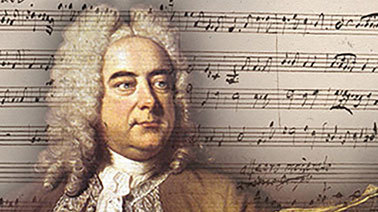
Handel’s Messiah traces the line between the messianic prophecies of the Hebrew Bible, and their fulfilment in Jesus. It is one of the greatest pieces of Western Music.
Written in 1741, The Messiah is a remarkable piece of music that traces the line between the messianic prophecies of the Hebrew Bible and their fulfillment in Jesus. It quickly became a classic and is often played around Christmas time as a celebration of and meditation on God’s loving plan of salvation. One of the remarkable things about the libretto is that it often ties together the Old Testament texts with new. In this beautiful song, he ties together the Isaiah 40:11 passage we examined above with Matthew 11:28-30.
So many of the Messianic prophecies are about God’s kingship, his rule, his judgement, but I love that one of the main images we are give of that Kingship is as a shepherd. These two images seem so far apart— the grand, opulent, powerful king, the simple, earthy, faithful shepherd. But the Messiah we receive is both, and the fulfilment of his kingship is to gather us to his bosom. To love us and treat us tenderly.
christmas is for the weary and the heavy laden It is for those who need to be scooped up in the arms of the good shepherdhis comfort is a part of his kingship2. Manchester by the Sea (2016)
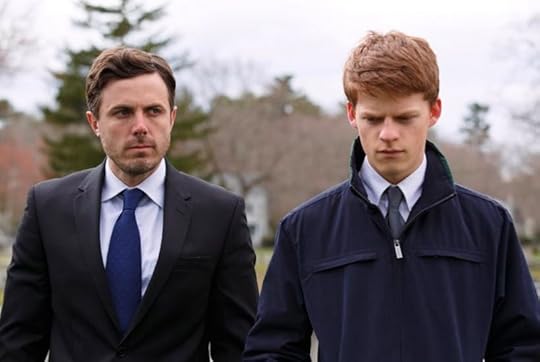
I like sad movies.
To many this is strange, but to some it is perfectly understandable. One such movie was Manchester by the Sea (2016). I don’t necessarily recommend watching it as it is a heart wrenchingly sad and difficult movie about a man whose life is truly tragic. But there was something in this movie that has stuck in my heart, changed the way I see, and something which I wanted to share with you.

The movie with the death of Joe Chandler, the brother and source of support and love of the main character Lee. Lee is a good, faithful man in many ways, but his life has been unbelievably tragic, and he carries a deep burden of guilt. Joe was the one person who helped lighten this load for him. Joe’s loss is a great one to Lee. When Lee returns to make arrangements for Joe’s funeral, they find that the ground is too hard to dig a grave; he must wait for Spring. The movie, then, takes place while Lee cares for his nephew and waits to bury his brother, following him through grief and hardship.

Finally, near the end of the movie, Lee is able to have a funeral for his brother. The scene is gentle, beautiful, sad but not emotionally manipulative. And singificant for us, “He Shall Feed His Flock” from Handel’s Messiah is playing over the entire scene.
As I watched the scene, I saw, for a moment, God’s deep love of his children.His heart of compassion and grief over our sorrows.His deep longing to gather us into his arms.I thought of the passage that Handel references “Comfort Oh Comfort my people… speak kindly to them and tell them that their warfare is over.
Surely, Lee’s character has been through warfare. And as the golden beauty of Handel’s alto sang over Lee’s moment of closure at his brother’s grave, I glimpsed God’s love for us. In all the paint and difficulty of the world, it is only natural to ask “Why would God allow this?” The truth is, I do not know. But what I do know is that Christ was a man of sorrows, acquainted with grief, that he enters into our tenderness and vulnerability. That his heart toward us the heart of a gentle shepherd, longing to hold us to his chest and lead us toward healing.
Like Lee, sometimes we have a hard time receiving that love, but it is there. Waiting gently and patiently.
I pray that you experience that love this advent.Peace,
Joy
December 9, 2018
The Mother

The Annunciation, Fra Angelico
And Mary said, “Behold, the bondslave of the Lord; may it be done to me according to your word.” And the angel departed from her.
— Luke 1:38
Mary, the God-bearer, shows us what it looks like to receive Christ, and to dwell with Him. If we want to be close to Christ this advent, let us follow in the footsteps of the person who held him closest: Mary. Join me this week as we meditate on the Magnificat, the Consolation of Eve, and Thomas Tallis' beautiful setting of her words.Start by listening to the podcast (purple bar below), and then follow along in the notes…The Magnificat (Luke 1:46-55)

Madonna of the Magnificat, Sandro Boticelli, 1481.
My soul exalts the Lord,
And my spirit has rejoiced in God my Savior.
For He has had regard for the humble state of His bondslave;
For behold, from this time on all generations will count me blessed.
For the Mighty One has done great things for me;
And holy is His name.
And His mercy is upon generation after generation
Toward those who fear Him.
“He has done mighty deeds with His arm;
He has scattered those who were proud in the thoughts of their heart.
He has brought down rulers from their thrones,
And has exalted those who were humble.
He has filled the hungry with good things;
And sent away the rich empty-handed.
He has given help to Israel His servant,
In remembrance of His mercy,
As He spoke to our fathers,
To Abraham and his descendants forever.This is the song of a heart shaped by scripture.
In many churches, pastors go to great lengths to emphasise the fact that Mary was young, unlearned, nothing special, but this is not the picture we are presented with in scripture. Mary’s song (Magnificat) draws from many old Testament prophets, psalmists, and stories, showing that she had a deep knowledge of scripture, that she had pondered it, and perhaps even that she had prepared herself for a moment just like this. Some have even suggested that Mary was dedicated to the temple and raised partially there (like Samuel). We know that she came from a priestly line because her cousin was a priest, and it is obvious that she took that priestly legacy to heart, that she listened when the Torah was read, that the words of the prophets had become the hope of her heart.
This hymn calls to mind numerous examples of Old testament women:Miriam leading Israel in song after the Exodus (Exodus 15:21)Hannah after God answers her prayer (1 Samuel 2:1-10)Deborah after victory in battle (Judges 5)Biblical scholars note that Eve’s story and song is less like the barren narratives of the Old Testaments and more like the Theophanies of the prophets and priests. God has dwelt with her, and she has seen the world as it truly is. In her hymn she proclaims God’s kingdom, the kingdom of God with us.2. The Consolation of Eve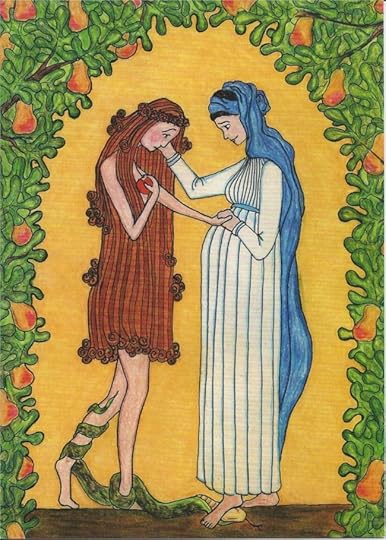
Mary and Eve made by a nun from Our Lady of Mississippi Abbey
Eve used the gift of free will to reject god.mary used the gift of free will to work with God.
This simple print was made by a nun at Our Lady of Mississippi Abbey. With simplicity and beauty, the image combines many biblical references to show Mary comforting Eve. Mary brings Eve’s hand to her Belly, showing her that the Redeemer is born within her as it was prophesied. She steps on the head of the snake (Genesis 3:14), showing that, just as God promised, Eve’s offspring eventually brought the one who would crush the devil. It is a simple but compelling image, that shows us the magnitude of Mary’s role in God’s plan of salvation for the world.
Mary, the Theotokos (God-bearer), was the first Christian, the first one whom with God dwelt. This is our destiny, and we must follow in her holy footsteps.psssst…. you can buy greeting cards and prints of this image on the monastery’s website. check it out!
3. Magnificat, Thomas TallisThe Magnificat is Mary’s prophetic outpouring of praise, and her anticipation of God’s coming kingdom.
As you listen to this beautiful piece by the famous English composer Thomas Tallis, meditate in your heart on Mary’s example of faith, of receptivity, of bravery, of complete surrender to God’s will. Pray that you too might be a God bearer, in your own capacity.
A blessed advent to you all! I look forward to next week. Warmly,JoyCheck out secret podcasts, christmas playlists, featured artists and more on patreon!!
This month I’ll be posting all kinds of Christmas goodies, so if you’ve wanted to give it a go, this is the month to try it out! This week I’ll be doing a secret podcast where I simulate a Lessons and Carols service, which is a classic English advent celebration. I’m excited about it, and I hope it will uplift your spirits! If you’re interested in supporting the podcast, check it out at the link below…
Joy Clarkson - Patreon
December 2, 2018
Advent Week One - The Coming

And the Word became flesh, and dwelt among us, and we saw His glory, glory as of the only begotten from the Father, full of grace and truth.
— John 1:14
“You know how it is when some great king enters a large city and dwells in one of its houses; because of his dwelling in that single house, the whole city is honored, and enemies and robbers cease to molest it. Even so is it with the King of all; He has come into our country and dwelt in one body amidst the many, and in consequence the designs of the enemy against mankind have been foiled and the corruption of death, which formerly held them in its power, has simply ceased to be. For the human race would have perished utterly had not the Lord and Savior of all the Son of God, come among us to put an end to death.”
Athanasius, On the Incarnation
The ComingAdvent, Week One
Advent is a time of hopeful anticipation.
Advent comes from the latin word adventus meaning arrival, invasion, or coming. It encompasses the wonderful, strange, beautiful idea that God came to earth, drawn by love, to redeem us. Since almost the very beginning, Christians have reserved the four weeks before Christmas as a season of advent, in which we prepare for God’s coming to earth in the incarnation, at Jesus’ birth. This practice has been around since at least the fifth century and likely long before. In advent, we celebrate Christ’s first coming, and pray for his second coming in which he will redeem the whole world.
for the next four weeks, I’ll be exploring the themes of advent through pieces of beautiful art on my podcast.Whether are you an advent pro, have never celebrated advent, or perhaps don’t even believe, I would love to have you join me!
Tune into this week’s episode to hear the history and purpose of advent!For best results, listen to the podcast (purple bar) above and follow along in the notes below!Advent Calendars - The History of AdventSince around the fifth century or before, Christians have marked the four weeks before Christmas as a special time of prayer, fasting, and contemplation, preparing their hearts for the coming of Christ at Christmas. This is a part of the larger church year, which you can hear more about in the podcast.
One way of marking advent is the advent wreath. There is one candle for each Sunday in advent.We have the German Lutherans to thank for this tradition, along with many other Christmas traditions including the advent calendar, Christmas market, and Christmas tree. Consider making an advent wreath with your family so you can celebrate together!

Advent wreaths are usually comprised of four or five candles. One for each of the weeks of advent respectively, and Christmas itself. A Lutheran pastor came up with the advent wreath to help the children of his congregation mark the days until Christmas.
Though the Lutherans began this tradition, many denominations have followed suit, making it one of the most common ways to mark the season.
Another lovely tradition, also started by the Deutschlander, is the Advent Calendar.
These were calendars (or clocks!) where each day had a different image or quote or verse for each day of advent. They were usually delightful and Christmasy and cozy. It is no wonder they are one of the few Christian traditions that have made their way into the secular mainstream! This tradition is less explicitly Christian, but it still fosters that sense of delight, anticipation and wonder. As a little girl, my mom got me advent calendars with little milk chocolates in each window. What could make a child long for Christmas more?!
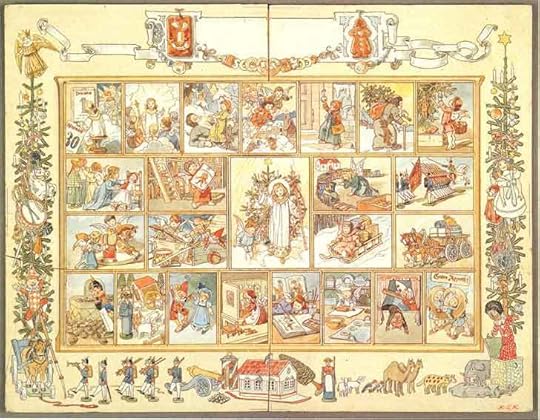
2. The Coming, R.S. Thomas - The Object of our Anticipation
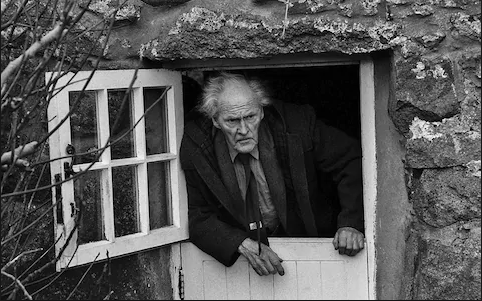
The poet himself…
The Coming by R.S. ThomasAnd God held in his hand
A small globe. Look he said.
The son looked. Far off,
As through water, he saw
A scorched land of fierce
Colour. The light burned
There; crusted buildings
Cast their shadows: a bright
Serpent, A river
Uncoiled itself, radiant
With slime.
On a bare
Hill a bare tree saddened
The sky. many People
Held out their thin arms
To it, as though waiting
For a vanished April
To return to its crossed
Boughs. The son watched
Them. Let me go there, he said.3. O Antiphons - The Three Comings
We know it as O Come O Come Emannuel, but this ancient song has been sung in monasteries for 1,500 years.
The O’ Antiphons date back to the early sixth century where they were sung in monastic communities before Christmas. The O’ Antiphons were so named because each one of them began with “O” followed by a name for Christ. There were seven O’ Antiphones, and one was meant to be sung each day the week before Christmas.
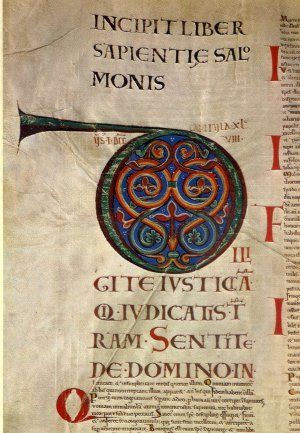
17 December: O Sapientia (O Wisdom)
18 December: O Adonai (O Lord)
19 December: O Radix Jesse (O Root of Jesse)
20 December: O Clavis David (O Key of David)
21 December: O Oriens (O Dayspring)
22 December: O Rex Gentium (O King of the Nations)
23 December: O Emmanuel (O With Us is God)
the first letter of each antiphon adds up to an acrostic in latin which reads “Ero Cras" which means “tomorrow I will be there,”anticipating Christ’s second coming
By singing these verses, the monks (or nuns!) both celebrated the beauty of Christ’s coming in the Incarnation and anticipated Christ’s second coming when he would make all things right. This is what we celebrate in advent: both the wonder of Christ’s coming into the world through the incarnation, and the hope of Christ’s second coming where he will redeem all things.
Bernard of Clairvaux, an 11th century priest, said that at advent we celebrate Christ’s Three Comings:Christ’s coming into the world at the incarnationChrist’s coming into our hearts every dayChrist’s second coming in which he will redeem all thingsAs we enter this advent season, spend a little time each day meditating on these three comings. Are you looking for some devotional books this advent? Here’s a few suggestions…
When I was young, my family would read this aloud in the afternoons. It has reflections and thoughts from many of the great spiritual writers over the centuries. A lovely read.
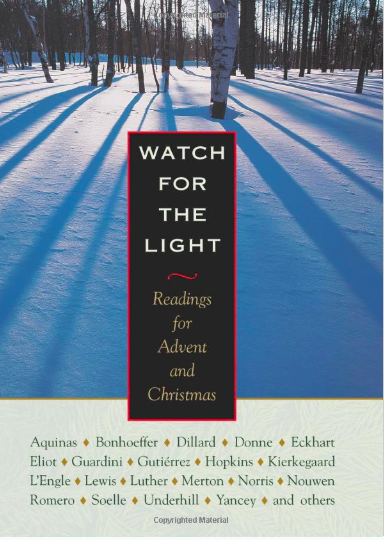
Watch for the Light - Amazon
I’m actually reading this one for the first time this year. Malcolm is a priest, poet, and professor at Cambridge university. This book is a collection of poems for every day of Advent, and then on through to Epiphany along with a little reflection on each day. It won’t give you a lot of scripture (though it constantly references scripture), so I like to supplement with something else as well. But I’ve really enjoyed it so far.

3. Biola advent project
Every year Biola University’s (my undergrad alma mater) Centre for Christianity, Culture and the Arts puts out Advent and Lenten devotionals. Each day they send you a devotional which includes a scripture reading, an image, a reading, and a song. As you might have picked up, this was a great inspiration for my podcast! You can subscribe by clicking the link at the button below…
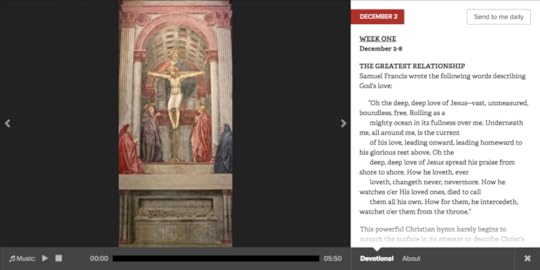
Learn more
A very happy advent to you, friends!I hope to see you here next week.
love,
peace,
joy
November 18, 2018
Feasting and Fasting... and Thanksgiving!

Rest and be thankful.
— William Wordsworth
Hello Friends! It is late November and I am thinking homeward thoughts. Thanksgiving always has this effect on me, especially since moving overseas. Thanksgiving is not celebrated here (obviously), and there’s nothing that makes one long for the comfort of home more than the imagination of hot meals, family gathered around the table, and traditions shared. But, it is special to celebrate here as well because all the Americans band together to celebrate… sometimes you end up having four thanksgivings when all is said and done!This week’s episode is on feasting!
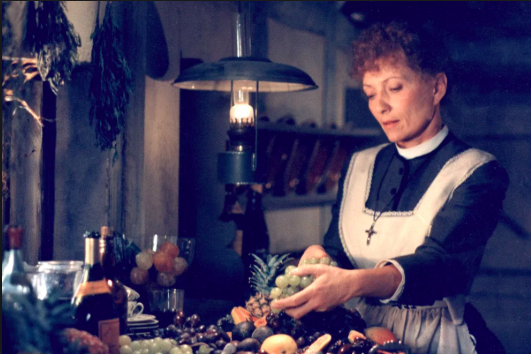
I recorded this episode several weeks ago intending to put it on the Patreon, but I enjoyed it so much, I wanted to share it with everyone. It’s about the profound spiritual meaning of feasting (and fasting), and about one of my favourite films… Babette’s Feast! My cohost today is my dear friend David Bennet.

David and I are kindred spirits, especially when it comes to food…David is also studying theology. We met in St Andrews and bonded over a shared love of Jesus, art, and food. He has a lovely Australian accent (Australia is his homeland) and makes a mean spanakopita. David just released a book of his own.It is called War of Loves: The Unexpected Story of a Gay Atheist Discovering Jesus. It is about his journey to faith. Home A Playlist for Thanksgiving I made the playlist below for you all! It is a collection of singer-songwriter-y songs about home, feasting, family and more. I thought you might enjoy listening to it while you mash potatoes, bake pies, and, let’s be realistic, wash disher. ;-) Enjoy!I’m thankful for all of you!When I began this venture, I couldn’t have imagined all the lovely friendships, pen-pal-ships, and encouragement it would garner for me. Thank you for spending time with me dwelling on beauty, goodness and truth!And a particular thank you to my patrons on Patreon! You have kept me afloat this year. It really means a lot.I wish you all beautiful and meaningful thanksgivings!Warmly,Joy
November 12, 2018
Waiting for Quiet

There used to be a Quiet waiting for me.A deep, consistent calm.I left it sometimes, but it never left me. I would wile away the days with nonsense, but when I returned in the stillness of the rising stars, it welcomed me back. It wrapped its arms around me while we watched the stars come out, one by one, together.Every whirling happenstance of life was merely a prelude to the next time I greeted Quiet, told it about everything and asked "What do you think it all means?"And Quiet always knew.It explained everything to me.But, we've grown distant, Quiet and I. Who knows why these things happen. Perhaps I stayed out one too many nights, while Quiet waited up, checking the time.And even when I returned on time, I carried the cacophony with me, the chatter of never ending noise. I was too restless. Quiet could not encompass me because I wouldn't stop moving.Quiet would beckon me, to look in its eyes, its ponderous eyes."One moment" I'd say, "I need to answer this email."So Quiet turned way from me. Even when I lie down to sleep, its back is turned to me. At least then Quiet used to visit me, at least then it would kiss my eyelids closed to sleep so that I awoke with the memory of its presence, however brief. But the flashing lights settled deep in my brain would burn its lips now. It could not touch me.Not even its breath washes over me in sleep.So Quiet left me.Sometimes I still call upon it.In the morning, on the train."I had a few minutes. I just wanted to say hi."It doesn't pick up.Or late at night when I am sad, with the kind of sad no noise can drown, no light can obscure.But it doesn't pick up.Not anymore.Should I write it a letter?But I don’t know where Quiet lives anymore. Perhaps in the mountains, close to the day blind stars. Or perhaps in a Monastery, slipping between the hallways during vespers. But in my heart I know: though I searched the whole world, Quiet would run away from me. Because I carry chaos with me. Noise is my constant companion. The dim light of screens hover in my oval eyes. They’re always with me.And Quiet is a jealous lover.So, I will wait for quiet. I will do nearly everything, almost anything to woo it back. I will be faithful to it.I'll spend my time on it.I’ll sacrifice my phone on its altar. I will look away from the lights and shifting shadows, into its fathomless face. I will take it with me, everywhere—on the train, to the madness of work, even to the chaos of my worries.I will look into its eyes in the morning, and in the evening. I will search for its gaze in the harsh daylight.I will love it more than my own voice.Until Quiet comes, I will keep vigil.Each night I will wait in the dark for its cool breath and bright eyes.In the morning I will seek nothing but Quiet.And when the time comes, Quiet will find me waiting.
November 4, 2018
The Celtic Way
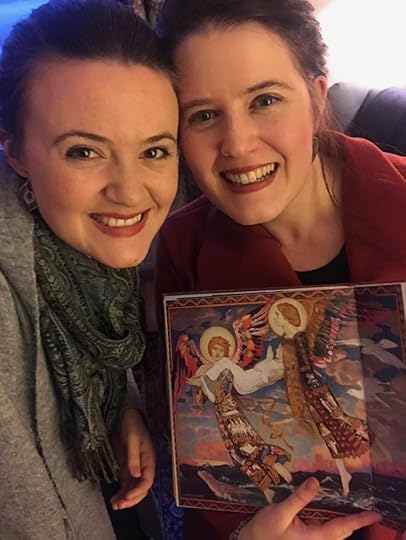
This week I had the great pleasure of co-hosting the podcast with my sister Sarah!
We are kindred spirits and best friend sisters. When we talked about what our topic would be, we decided on a mutual love we both share: Celtic culture. We have both been drawn to the music, the imagery, and the spiritual legacy of the Celtic world (Scotland, Ireland, and parts of England, Wales, and Cornwall). There is something compelling, haunting, and beautiful about it. In the podcast today, we explored three examples of the rich legacy of Celtic Christianity: the beautifully illuminated manuscripts of the Irish scribes, the evocative and mystical prayers of the highlands, recorded in the Carmina Gadelica, and the aching, lovely, modern expression of Celtic music by Loreena McKennitt.
We had a blast preparing this podcast for you. And we also learned that our voices sound very similar! Genetics, man!
We are delighted to share this delight of ours with you!We hope this podcast gives you new paths to explore and beauties to enjoy!Oh, and by the way:
Sarah (my sister) is a soul filler: she takes beautiful pictures, she writes beautiful words, and she just published a beautiful book!She is a constant balm to my soul and through her writing she is a balm to others. You won’t be disappointed by finding and following her. Find her instagram, blog, and book at the links below:
Sarah's Instagram
Sarah's Blog
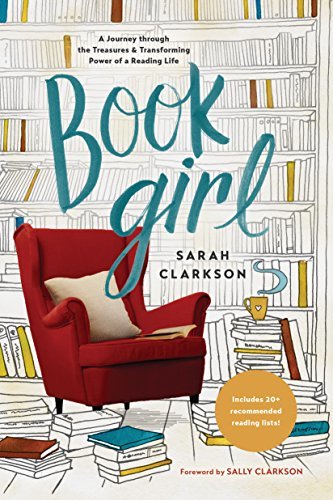
Book Girl: A Journey Through the Treasures and Transforming Power of a Reading Life
By Sarah Clarkson
listen to the podcast at the widget below…Illuminated Manuscripts
Sarah's Instagram
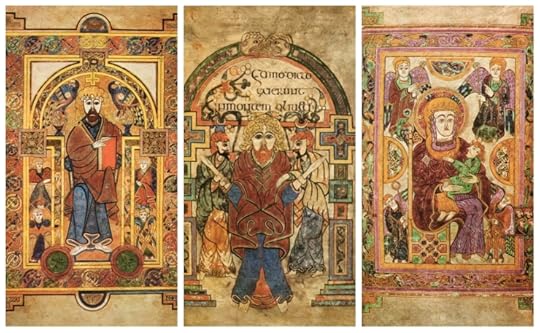
Did the Irish save civilzation?When the Barbarians sacked Rome, some feared that all the wisdom of the Western world would be lost. The irish scribes saved it.
In 410, Visgoths sacked Rome. It was the first time in 800 years that Rome had fallen to a foreign enemy. The country that had conquered and subdued many other countries suddenly found itself under attack. This had huge ramifications for European culture and history. Rome was a literate society that had exported the use of its language for scholarly research. Even Christianity adopted latin, writing many of the early Christian texts in latin. So, as the Visigoths passed over Europe, the fear was that not only would they conquer the cities, but that they would burn the libraries, destroying the Christian, Jewish and Pagan wisdom that had been preserved carefully for centuries upon centuries.
This is where the Irish saved the day.
When Patrick came to Ireland (around 430), he brought not only the gospel, but the alphabet. Prior to Ireland’s conversion to Christianity, they had been an oral culture, meaning that they passed down their religious beliefs, official records, and cultural tales orally rather than by writing them down. Christianity brought them a new tool for storytelling: a written alphabet. Bella Schauman writes “The Irish have always loved words. In the pre-christian period, when the literary and legal traditions of the country were committed to memory rather than parchments, jurists and poets were men of high status. The legal texts of this native tradition, once written down, filled many thick volumes. The poetry filled many more. We have no manuscripts of these texts written before 700, but it seems certain that the Irish accepted the Roman alphabet and habit of consulting written authority when they accepted Christianity (5th century). The religion of the book brought the arts of the pen.”
Once the Irish had the alphabet, they began to read, and to write down, everything they could get their hands on. The Irish scribes wrote accounts of their own myths and legends, they copied manuscripts of the great classical, Christian, and pagan texts, and, perhaps most lovely of all, they made beautiful reproductions of gospels, psalters and bibles. In his book How the Irish Saved Civilszation, Thomas Cahill describes it in the following way:
These scribes then served as conduits through which the Greco-Roman and Judeo-Christian cultures were transmitted to the tribes of Europe, newly settled amid the rubble and ruined vineyards of the civilization they had overwhelmed. Without this Service of the Scribes, everything that happened subsequently would have been unthinkable. Without the Mission of the Irish Monks, who single-handedly refounded European civilization throughout the continent in the bays and valleys of their exile, the world that came after them would have been an entirely different one—a world without books. And our own world would never have come to be.
— Thomas Cahill, How the Irish Saved Civilization
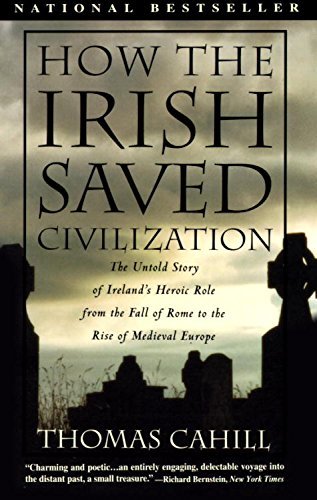
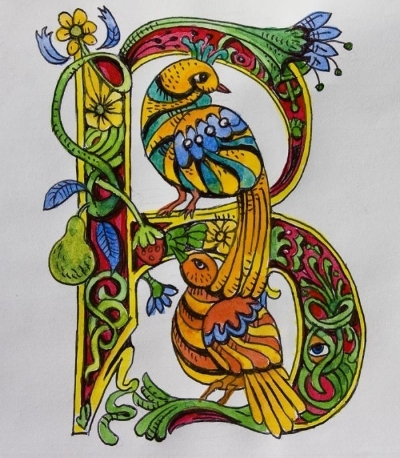
This is a modern example of how scribes might have decorated a single letter that began a section of an important passage. Isn’t it beautiful?
The scribes scribbled away, saving the riches of Christian and Western literature.
The scribes scribbled away in the Hiberno-Scottish and Anglo-saxon missions across Ireland, Scotland, and Northern England. They not only copied for functionality but for beauty, developing their own unique Celtic style, intricately painted, weaving animals and plants into leaves, and brightly coloured.
One of the great leaders of this movement was St. Columba (521-597). He was one of the twelve apostles of Ireland. He founded Iona Abbey, a small abbey off the coast of Scotland. That abbey created beautiful works of art and scribal wonders, even while repeatedly being attacked by Vikings. Columba was a priest and a poet. It is to him that the Book of Kells, also called the Book of Columbekill (book of Columba) is attributed in annals entry in 1007.
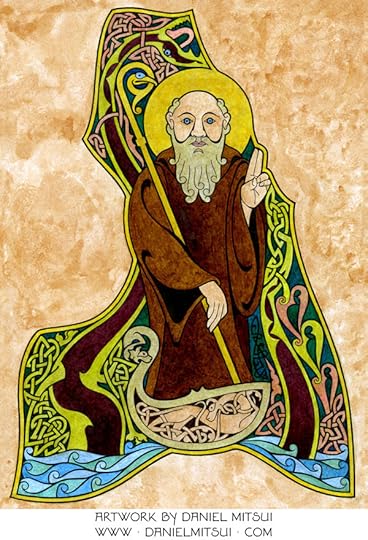
Saint Columba chillin’ like a villain!
While Europe burned, the Irish, Scottish and English monks wrote and wrote, preserving the good and true, and adding to the beauty. Through retreat, scholarship, and beauty, one could say they saved civilzation.
check out the link below to an online catalogue of images of the book of kells.Book of Kells
We live in a world oversaturated with knowledge. What does it look like for us to be the scribes of our world? How can we preserve truth and goodness, and add beauty? What do you think?
2. Carmina Gadelica
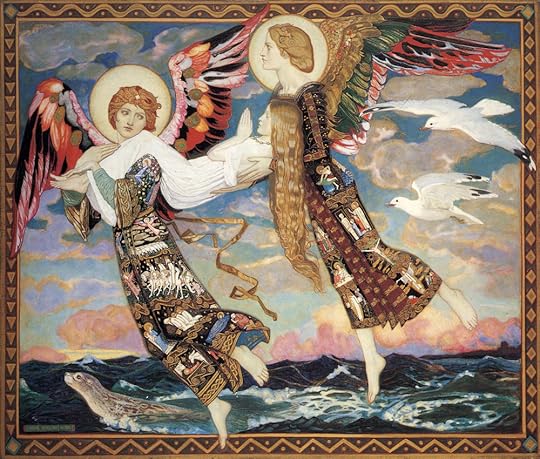
Saint Bride (1913), John Duncan.
The Celtic people had a language of prayer developed from a wonderment at God’s presence in the glory of nature.
In their pre-christian years, the Celts were deeply attracted to the glory of nature. They perceived something divine in its intricacy and loveliness. They told stories about and imagined what kind of gods or God might have created it, what he or they must have meant by it all. When they converted to Christianity, they saw Jesus as the answer to all the longings and beauty they saw in creation. This was the God they had always longed for! The myth of all myths! Their art and prayers and poetry, therefore, retain the wonder at nature and that certain Celtic something. They didn’t reject their culture, they simply redirected it toward Jesus.
Shaped both by the ‘cosmic sacramentalism’ of the wider church and the ‘textual sacramentalism’ of Eucherius, the Celts had a comprehensively sacramental view of life so that ‘whether walking, working, reading or praying, one was in two worlds’, the physical interpenetrated by and revealing the spiritual. ‘One could take all that entered the mind as both real (in a transient earthly/physical way) and as the shimmering image of the higher heavenly world.’
— Thomas O’Loughlin, Journeys on the Edges: The Celtic Tradition (London: Darton, Longman and Todd Ltd., 2000) p. 35)
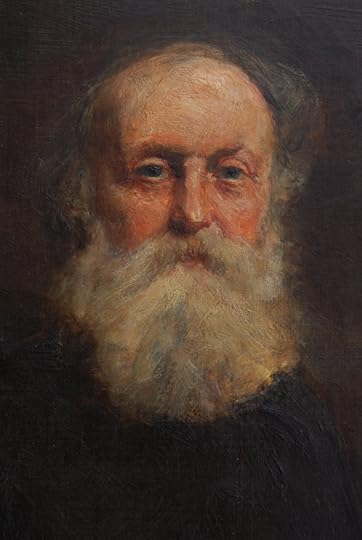
Carmina Gadelica
Despite Patrick’s literate influence, much of the Celtic spiritual tradition continued to be passed down by oral tradition. Fathers and mothers, towns, priests, and parts of the country passed down their precious prayers known only by memory. Their beauty was drawn from the places in which they were prayed. They saw God as present in all the ordinary parts of life, and looked to the specific glories of their towns and countryside to praise God. Between 1860 and 1909, Alexander Carmichael (full name Alexander Archibald Carmichael… isn’t that wonderful?), a Scottish folklorist set out to record these beautiful prayers in Carmina Gadelica. These prayers are beautiful. At the link below you can access all of them.
I highly recommend giving them a look, and perhaps choosing one to pray every morning for a week.
Perhaps it will infuse your view of the world with wonder!
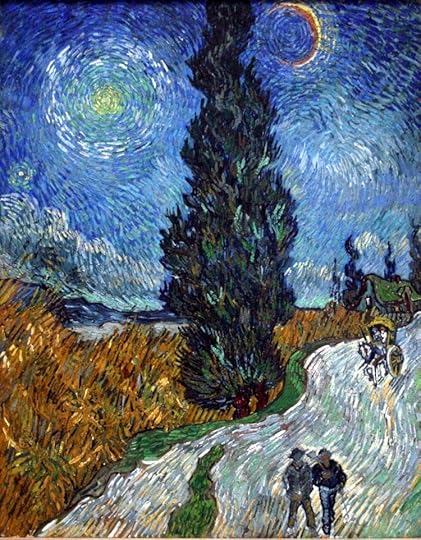
BEHOLD the Lightener of the stars
On the crests of the clouds,
And the choralists of the sky
Lauding Him.
Coming down with acclaim
From the Father above,
Harp and lyre of song
Sounding to Him.
Christ, Thou refuge of my love,
Why should not I raise Thy fame!
Angels and saints melodious
Singing to Thee.
Thou Son of the Mary of graces,
Of exceeding white purity of beauty,
Joy were it to me to be in the fields
Of Thy riches.
O Christ my beloved,
O Christ of the Holy Blood,
By day and by night
I praise Thee.
“Lightener of Stars,” Carmina Gadelica
Read more at the link below!Carmina Gadelica
3. Loreena McKennit
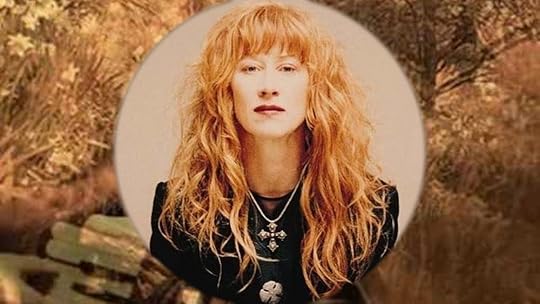
Loreena McKennitt set out to capture the heart of Celtic Music.
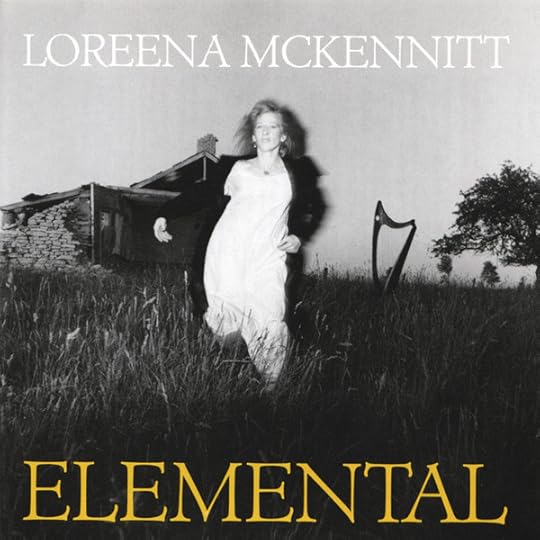
Elemental (1985)
We first learned to love Loreena through her 1985 album Elemental. This haunting album, which was recorded in a studio in a field of sunflowers (obviously!), aimed to capture the heart of celtic music. McKennitt chose many traditional tunes to fill her first album, along with beautiful settings of poetry. For all you Anne of Green Gables fans out there, she has a lovely setting of the Highway Man. Her wistful soprano voice singing out the gentle and aching celtic tunes have an almost enchanting affect.
McKennitt music catches the haunting mixture of desire, grief, and hope that makes Celtic music so appealing.Sarah and I think that because the Celtic people had such a history of sorrow and resilience, their music doesn’t shy away from themes of disappointment and death. But in between the longing, there is an unmistakable shimmer of beauty beyond the darkness. It acknowledges difficulty, pain, mystery, but it calls you more deeply into hope.
November 1, 2018
All Saints' Day
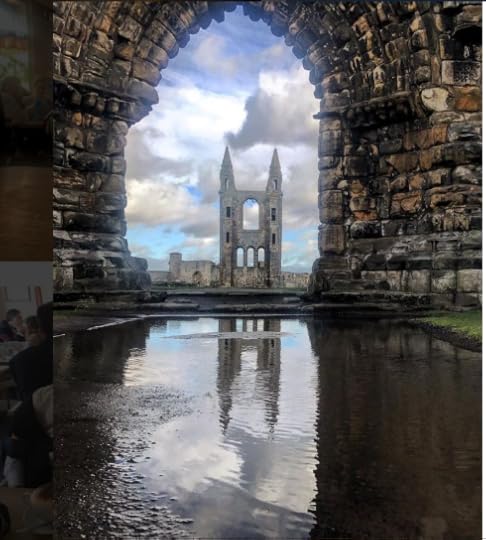
It was All Saints’ day, and not at all the time for new seeds to grow in the garden.
The rain dropped gently on the ruins, running down the old cathedral wall, soaking the coloured leaves, aiding them on their journey from crisp, crackly autumn leaves to the soggy brown mulch that would help the grass spring green again next year. This is how it is in the world: things grow, they bloom, and they die, and in their dying, they help a new thing grow. It is a beautiful thing, they growing and blooming, the life-giving death. But death is woven into the whole thing, inextricable, a permanent and unwelcome guest.
Trees were not the only thing planted there.
People were planted there too.
Once upon a time, this was one of the greatest cathedrals in Europe. But bickering bishops and impatient reformers conspired to smashed its windows, and then, undecided in their fervour, they left it to decay with the years. Eventually, the town started to use the cathedral stones to build cottages in town. Just like the trees shed their leaves and fertilise the ground where new life will grow up, the cathedral shed its stones so that fishermen and a bakers and scholars could be warm in the winter. And then, when the cathedral had shed nearly all its stones, they began to use it as a graveyard. In the place where the sanctuary used to be, where worshippers used to walk, they were now buried.
I had often though that the stones markers looked like the little tabs in a spring garden that say “carrots” or “lettuce,” proclaiming, rather remarkably, that from the ash black soil, tender life will soon shoot up. Every year it is remarkable. Seeds are locked in their little death chambers, deep in the cold ground, but come Eastertide, they peek out of the earth, tender and small, and very, very alive.
But these markers are not for carrots, they are for people.
Hamish. Elspeth. Alasdair. And a thousand other Scottish names, a garden variety! Some of the names had begun to fade, washed away by a thousand autumn rains. It’s odd, really. Usually, when things in nature die, they feed the earth and new life springs up in its stead. It’s this way with the autumn leaves, the spring seeds, even the great stone cathedral gave new life with its dying. But humans keep dying, being planted in the earth, and staying there. The world is full of graveyards full of people! Every year, I’d watched the rector plant new people in the cathedral, and mark their graves, like carrots, in hopes that next year they might emerge. But each year, they stayed stubbornly planted. Stubbornly dead. Unwilling to yield new life from their own death.
And so, it seemed, it would be for ten thousand more.
But that is why I’m writing to you. In the blink of an eye, it all changed.
It was All Saints Day. I walked into the side gate at the ruins, in the back. A dense fog hung over the town that morning, but all at once, burst of warm, fragrant air spread over cathedral grounds. The grass quivered under its touch, and as they quivered, the whole earth seemed to rattle. The grass was green, but from some unknown centre, a greater vividness began to spread over the earth, the took on a deep, pungent green, as though it had actually been grey all along.
For a moment, I had forgotten to breathe, but as the rattling earth began to shake more violently, I couldn’t help but shout in fear. Golden light streamed from the cracks in the cathedral wall. The unsettled earth had torn the green grass, and the rich brown earth lay in clumps around the graves. Then, the most frightening thing of all began to happen.
From the unsettled earth, bright white bones began to emerge. Hands, heads, legs, spines, began to assemble themselves and to stand, falling through the empty frames of the skeletons as they began to stand at their full height. There were tall skeletons, short skeletons, sturdy ones and frail, adults and children. I stood, terrified, could they see me?
Again, a warm breath, cast itself over the ruins, tossing my hair into my eyes. When I cleared it away, what I saw caught the scream in my throat, paralysed with terror and wonder.
Where skeletons once stood, I began to see human, fleshly bodies. Out of the corner of my eye, I saw a terrible light, and I turned and saw. There, a skeleton stood, almost patiently, as ribbons of light twirled around it, carefully spinning layers of flesh and skin back onto its body. In the course of a few moments, the skeleton was a discernible human figure, a stout young man with dark curly hair, and a long noble nose. Was he naked or clothed? I could not tell. He gazed down at his hands, turning them back and forth from their palms. As he did so, a great delight spread across his face. He began to run, to shout with joy.
I looked about me. Nearly all the skeletons had been reclothed in skin, and waves of pleasure seemed to sweep over the graveyard, as the skeletons realised they were no longer skeletons. They greeted each other with laughter and embraces. Amongst all this hilarity, I saw a tall, lean woman with cascades of curly red hair, awaken and look calmly about her, a furrow on her brow. She looked down, and her eyes widened. Beside her a small skeleton was being wrapped about with the golden light. Out of the blinding glow, a child, with wild red hair like her own emerged. He looked at her and laughed, reaching out his arms to her. Relief from a long spent grief spread across her face as she scooped him into her arms and held him tightly. In their embrace, they seemed to both grow grow and shrink. When they finished embracing, they were the same size. She had grown somewhat younger, and he somewhat older. They looked to one another, joined hands and set out, it seemed, to find someone else.
All around me I saw such scenes of reunion and transformation. Sisters and brothers, husbands and wives, a whole family with the same chestnut wavy hair. They all came to life, embraced, and laughed. They all seemed to be the same age. They were neither young nor old, but they were certainly not middle aged. They seemed to be the age toward which youth strives, and which old age remembers as if it was a dream. And when they greeted each other, they began to sing, as if it was the most natural thing to do. A cacophony of melodies echoed through the graveyard, but somehow they were all in tune. They bounced off the walls of the cathedral, and as my eyes followed the sound, I realised that as I watched the reunion of the graveyard, I had nearly missed another miracle: the resurrection of the cathedral.
In their midst, and yet towering over them, there was a woman made of the stones of the cathedral. She was sleepy, and the strands of her hair, made of moss and grass and tree branches hung down past her waist. As she lifted her hands to rub her sleepy eyes, pigeons flew in every direction, off to tell the good news: the Cathedral is finally awake!
And she was! Her eyes glistened a transparent blue, and as she surveyed the merry surroundings, she began to laugh. Her whole stoney body shook with delight, pebbles and stones came tumbling off her walled body, but posed no danger to anyone. Her throaty joy echoed through the town, a glorious crescendo to the already magnificent chorus of voices. She laughed until she cried, and her tears, turning to diamonds and sapphires and rubies as they streamed down her face, fell unceremoniously on the ground around her. She shook her mighty head. Strand by strand, the grass fell from her hair, revealing streams of radiant light that floated in the air as though she were suspended in water. The Cathedral spoke:
“All my friends are awake! You known, you unknown saints!”
Her voice washed over the cathedral grounds like a power wave. All the souls turned toward her and cheered.
“Let us go to see the King! For it is my wedding day.”
She turned away from them, toward the sea and the east. As she did, her gown of light, laced with beams of radiant colours spread over the graveyard. Without instruction, the spirits climbed upon her train, helping each other up and singing as they did. The Cathedral raised her arms to greet the morning, as the sun crested the sea’s horizon. Had it been night all along? How had I not noticed?
With all the spirits aboard, the cathedral began to walk. Over, the cliff, onto the beach, and finally onto the waves of the North Sea. She glided on the waves toward the sun, walking on the water as lightly as a feather. The saints, still riding on her train, were bent on their knees staring into the waves with amazement and delight. They began to reach their arms into the lapping water, wet up to their shoulders. All at once, men emerged from the waves, and some women too. Sailors and seafarers who had drowned. The were pulled up on the cathedral’s trail, embraced, and met with laughter and song. Some ran to find their loved ones, some simply took in the glory of all the saints and the cathedral, and knelt to pray with thanksgiving.
They began to pass out of my sight, and into the sun.
Suddenly, I was taken with a desperate sadness. I longed to be with them! Had they gone where I could not go? I fell to my knees, my face to the ground, and prayed:
“Oh, Lord! I want to join their company! To worship you forever!”
When I raised my eyes, all was as it had been.
The Cathedral was still there, it’s stones grey and wet with rain. The sun was setting. The graves untouched, patient, un-sprouted. But, it had all happened, I knew it to be true. Was I left behind? Was it still to come? Did I, too, need to be planted before I could rise?
I heard the bells of All Saints on North Castle Street. I took myself to church, to pray that I might be ready when that Holy Day came, that with the Saints and with the Church, I might rise and run and worship forever in God’s glory.
O ALMIGHTY God, who hast knit together thine elect in one communion and fellowship, in the mystical body of thy Son Christ our Lord: Grant us grace so to follow thy blessed Saints in all virtuous and godly living, that we may come to those unspeakable joys, which thou hast prepared for them that unfeignedly love thee; through Jesus Christ our Lord. Amen
October 22, 2018
The Disappointed Generation

I feel as though I was deceived, I never found love in the city. I just sat in self pity and cried in the car, oh, I’ve just had a change of heart.
— "Change of Heart" by the 1975.
Over the last several years, I’ve received numerous emails asking for advice about millennials.
People seem to think that, as a millennial, I have insights into my own enigmatic generation. These missives vary in tone from genuine curiosity, to confusion, to suspicion, to condemnation. People generally write out of a genuine desire to understand, to help, or to guide their young relatives, children, and parishioners. And they’re worried— they sense a profound angst in my generation, and a great dissatisfaction. Where does it come from?
And culture at large is fascinated by our trend beer drinking, trend bucking generation. Corporate America bewails the millennial aversion to big chains, which has supposedly caused the demise of restaurants like Applebees and Buffalo Wild Wings. Millennials ruin other things as well: Fortune reported that millennials are “ruining divorce,” partially because none of us are getting married. But we’re not just ruiners! We are also responsible for the resurgence of public libraries, local food options, and veganism. A lot of us live at home. We are the most depressed and anxious generation in recordable history.
I see myself and my friends in these statistics. But I also I think attempts to discover homogenised explanations for a whole generation will inevitably go awry. Statistics can’t capture the soul of a generation.
I do think there is something that unites us as a generation, a shared emotion: Disappointment.There is an abiding sense of disillusionment, disappointment, and betrayal. A sadness, a regret, a cloudy resignation to an unknown future. Perhaps this is why most of our humour is so ironic and so dark: nothing is certain, and everything is up for ridicule. Don’t be too sincere, too earnest. Life will eventually let you down. What is it they say about laughing so you don’t cry?
Often, this presiding disappointment is identified as whininess. The message from many well meaning Baby Boomers and Generation X'ers is to pull it together, kids! Pull up your boot straps (whatever those are!), you’re not living through a World War or Vietnam, what’s your problem? Gain a little resilience! And perhaps, sometimes, we need that message. I know I certainly have at some moments of my life. But, you know what else is true?
In our formative years, we saw two economic crashes.We saw one and now two Catholic abuse scandals, and countless evangelical pastors fall into disgrace—affairs, abuse, corruption. We were born into a confusing war in the middle east that never seemed to have never really began, and never seemed like it would actually end. We grew up in an era of unprecedented political polarisation. We’ve watched the sky grow cloudier with pollution, the seas rise with heat, and species disappear at an alarming rate. We grew up being told that if we worked hard and got good grades, we could be stable, have a job. And now that most of us have graduated, we watch as the price of living soars higher and higher while the average income hovers steadily over the the same line it did in the 80’s. To put it as so many 90’s parents in the films we grew up watching… We’re not angry, we’re just disappointed.But, of course, there is a bit of anger in there as well. After all, with disappointment comes a sense of betrayal. Raisins in the cookie? not CHOCOLATE? How could you! The disappointment we are experiencing as a generation doesn’t stem simply from the fact that the world right now is kind of a bummer. It stems from being given a vision of life, set up to live into it, only to find it was impossible.
I was reminded of this recently while listening to the song “Change of Heart” by the 1975. In the song, he describes waking up blearily from some illspent evening, going home, and realising that a life he once thought would prove exciting, edgy, and satisfying was actually disappointing. The most striking lines read:
I feel as though I was deceivedI never found love in the cityJust sat in self pity and cried in the carOh, I’ve just had a change of heartThis references a song in their first album, whose resounding chorus is: “If you want to find love, you know where the city is.” The song “Change of Heart” references is one that promises excitement, fulfilment, and even transcendence by seeking a life in the city, full of people to love, drugs to do and money to make. The whole second album, and this song in particular, proclaims a resounding recantation of those sentiments. He didn’t find love in the city. All those things he thought would bring satisfaction turned out to be either unattainable or not worth it. Even the girl with a “face straight out of a magazine” proves disappointing, she lights her cigarette on the wrong end, now she just looks like anyone.
Life is lonelier, and harder, and way more expensive than we thought it would be.When I listened to this song, I thought: Yes. That is what it feels like to be a millennial.
We were told the world would be a certain way. That if we lived a certain way, life would be satisfying, good, prosperous. But all those things are turning out to either be unsatisfying or unattainable. And it’s not just about the economy, or politics, or jobs.
Nowhere is this more evident than in the realm of personal relationships.
Some were taught that sex is a big deal, but not that big of a deal. The only guidance they were given was to follow their hearts, to do what seemed right as long as it didn’t hurt anybody. But humans are complicated, and sometimes our hearts want stupid things. Even an enthusiastic yes can’t guard a heart from scars and pain. “I would have done things differently” one of my friends said to me, “but no one gave me any guidance.” So they bear scars they didn’t want, but didn’t know how not to get.
They were told a certain way of living would lead to happiness, and it didn’t.
But then there’s another crowd. The one who grew up being told that if they were patient, godly, good, that God would reward them with a happy marriage and a stable life. And hidden behind this promise was the looming fear that if you messed up— even once!— God would know, and you wouldn’t get your happy ending. But where are those happy marriages? There are 101 unmarried adults in America, which amounts to 45% of adults, the highest its ever been.
Was the price of purity too high? Did we all doom ourselves to loneliness?
I feel as though I’ve been deceived…So, we’re disappointed. Economically, politically, personally. And you know what? Disappointment is a perfectly rational response to the strange world we’re inheriting. The world is often disappointing, sometimes our lives are disappointing. We can’t pretend it is not so. But our disappointment is not all bad news.
I think our disappointment could actually be a great force for good.In disappointment there is also an opportunity for repentance, for turning away from the empty answers that got us to this point. When we reckon with our disappointment, when we look the world we’ve been given straight on and recognise its unsatisfying, unsustainable ways, it offers us the opportunity to make a difference, to choose something else. Disappointment offers the chance for, as the 1975 forcefully note, a change of heart, a turning away from empty ways towards something new.
I don’t want my generation to be defined by their disappointment. I want us to be defined by what we made of disappointing times.For the last several years, Wendell Berry’s writings have been one of my main companions in wrestling with disappointment and the question of how to live in our strange and confusing times. Wendell Berry is a man for our times. And one of his characters in particular speaks to me: Hannah Coulter. In her novel, Hannah Coulter, Hannah lives through a series of disappointments: her first husband dies in WWI, she struggles financially, she grieves as, one by one, her children choose to leave the agricultural life her and her second husband make. Hers is a story of disappointment. But throughout it all, there is a stubborn hope, a resistance of giving into the modern malaise. One passage in particular speaks to me:
“You mustn’t wish for another life. You mustn’t want to be somebody else. What you must do is this:'Rejoice evermore.
Pray without ceasing.
In everything give thanks.'
I am not all the way capable of so much, but those are the right instructions.”
Hannah Coulter taught me that we can’t ignore disappointment by sinking into the passivity of false contentedness. You must reckon with disappointment, but you mustn’t sink into its murkiness forever. Our life will be decided by how we handle disappointment. Do we ignore it, slowly numbing ourselves from any real desires? Do we sink into a permanent state of griping, as bitterness takes over our personality and life like a parasitic weed? Or do we grieve, wash our faces, and stoop to pick up worn out tools, praying for new energy and creativity to make something beautiful with the shards and pieces we’ve been given.
We can’t turn our backs on the times we’ve been given, but we can make something beautiful from them.So, when people ask me what defines millennials, I answer: we’re disappointed. But in that disappointment there is a hope. Hope for a change of heart, like the 1975. Hope that returns to the old paths, and digs roots deeper like Hannah Coulter. Hope that our disappointment will helps us put to death the idols of wealth, individualism, and false liberty that have led us here. It might look radical, it might cost us a lot, but we know the cost of emptiness, and nothing is worth that cost.
Millennials are disappointed, but in that, there is hope.Friends, what will we make of the world?Podcast…This week I recorded a podcast about disappointment. I explored the themes in the post above through the work of the 1975, the film Ladies in Lavender (2004), and Wendell Berry’s novel Hannah Coulter (2004). Give it a listen, and check out the show notes below.
Change of Heart, the 1975
I really enjoy the 1975.
It’s sort of off brand for me. They’re an angsty, drug using, post modern, Mancunian (natives of Manchester England) punk band. I’m a happy, straight laced, Christian, North American academic. But something about them has always captured my attention. I’ve followed their band for about four years now, and this is what I’ve come to realize about them.
They’re honest.
They feel dissatisfied (disappointed) with modern life.
They want something more out of life.
And I do too.
I don’t endorse their music as a moral guide or something to encourage one’s soul. However, I think that paying attention to artists that don’t share our world view can help us get a pulse on the passions, issues, and desires of the world around us. And I think this is true of the 1975. They are particularly insightful on the faults and desires of the modern secular world. And their evolution of thought can be observed through the difference between their first and second album.
First Album - The 1975It’s black and white, harsh, ironic, sarcastic, edgy, cool, atheistic.
Notice that’s all black and white

Wee matty singing sad songs…
In this album, they are dissatisfied.
There is a sense that ordinary life is not cutting it. They want more. In some ways, this album feels very adolescent— they’re rebellious, cool, defiant, dramatic. They seek significance through rebellion, transcending the system, risky behaviors. What does life mean anyway?
All that will begin to change.
Second Album - I Like It When You Sleep, For You Are So Beautiful Yet So Unaware Of It This album is softer, questioning, playful, sad, desiring, agnostic, open, disappointed.
Look! It’s not black and white anymore! It’s pink!

Thank you for the Roses, Matt! So kind.
The edginess wore off, and Matty wants something more.
This album doesn’t have the rebellious rejection of everything traditional like the first album. This album is searching. He even writes a song to Jesus, the chorus of which is “I’m asking you Jesus to show yourself.” Perhaps this is only a rhetorical move in the lyrics, but I think, lingering behind all the irony, there is an honest wish that Jesus might show himself.
The song “Change of Heart” represents Matty’s disappointment with the life he’s been living, the people he’s around, and his desire to change.BE FOREWARNED: not a family friendly song. I cut out the iffy parts in the podcast. So, if you’re bothered by adult content, just listen to that!
I feel as though I was deceived. I never found love in the city. I just sat in self pity and cried in the car, oh I’ve just had a change of heart.
— - 1975, Change of Heart
The 1975 are honest.
The life he’s been living has lost its sheen. The glamour of edginess is wearing off. He needs something to tie himself to. He’s disappointed.
Disappointment can be the gateway to repentance.Repentance is a turning away from one thing and toward another. The prodigal son turned toward his home. That was the beginning of his salvation. Sometimes disappointment can actually be profoundly important. It can be the thing that turns us away from empty things, and towards meaningful things.
I think many people my age feel disappointed.Many were told to follow their hearts and just not to hurt people, and found themselves in their mid twenties with scars and brokenness they didn’t bargain for. On the other hand, there are many who thought it they did everything right, life would be easy and blessings would abound, and been disappointed, sometimes, to encounter loneliness and years of waiting.
I think with both of these, disappointment is an opportunity. The opportunity to figure out what really is important. What does fundamentally matter.
To ask for a change of heart.2. Ladies in Lavender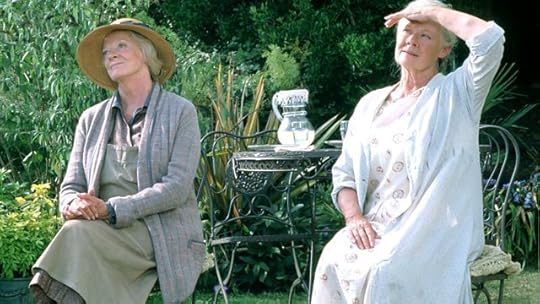
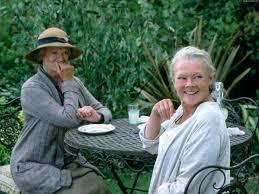
Ladies in Lavender is a story about sisters, memories, disappointment and surprise.
When a handsome, foreign musician washes up onto the shore of a pair of spinster sisters, excitement abounds. The sisters, who have lived a good, but boring life, find great delight, interest, and purpose in taking care of this talented young man. However, the unfulfilled desires of one sister’s youth jeopardise the delight of having the young man there.
The story teaches us that we must let go of our old disappointments to be able to properly enjoy the unexpected gifts that may come our way in life.
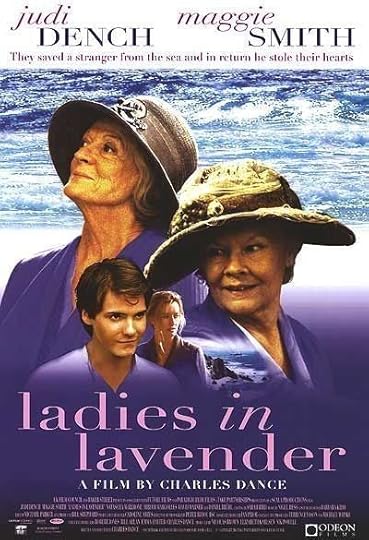
2. Hannah Coulter by Wendell Berry

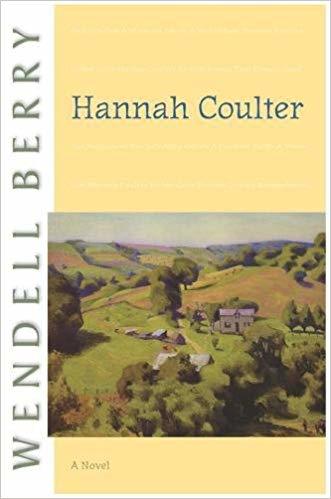
Most people now are looking for a better place, which means that a lot of them will end up in a worse one. I think this is what Nathan learned from his time in the army and the war. He saw a lot of places, and he came home. I think he gave up the idea that there is a better place somewhere else.
There is no ‘better place’ than this, not in this world. And it is by the place we’ve got, and our love for it and our keeping of it, that this world is joined to Heaven. . . .
’Something better! Everybody’s talking about something better. The important thing is to feel good and be proud of what you got, don’t matter if it ain’t nothing but a log pen.’
Those thoughts come to me in the night, those thoughts and thoughts of becoming sick or helpless, of the nursing home, of lingering death. I gnaw again the old bones of the fear of what is to come, and grieve . . . over . . . (those) who have gone before. Finally, as a gift, as a mercy, I remember to pray, ‘thy will be done,’ and then again I am free and can go to sleep.
— Wendell Berry, Hannah Coulter
Many thanks to my supporters on Patreon who have made this podcast possible! I could not do it without you.
If you’re interested in getting more out of the podcast and supporting me as well, check out the Patreon. For $10 a month you will get secret podcasts, monthly newsletters, playlists, and special essays. I hope you’ll check it out!
Joy Clarkson - Patreon
Joy Marie Clarkson's Blog
- Joy Marie Clarkson's profile
- 227 followers



